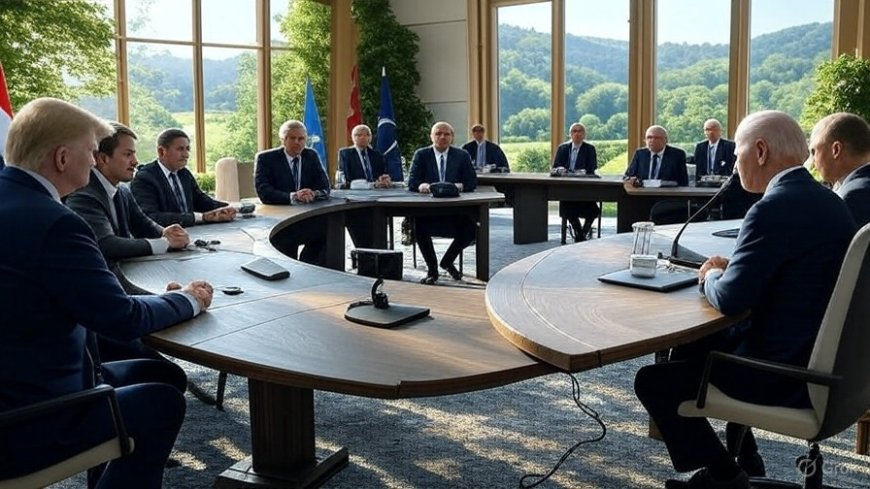Behind Closed Doors: Inside the G7 and G20 Talks Reshaping the Global Future in 2025
Discover the major global decisions coming out of the G7 and G20 talks in 2025, from economic recovery and climate policy to tech regulation and geopolitical strategy.

As the world navigates a complex maze of geopolitical tensions, economic recovery, and climate urgency, the G7 and G20 summits have become critical platforms for shaping the next phase of global cooperation. These high-stakes meetings—often conducted behind tightly guarded doors—are where economic blueprints are drawn, alliances are tested, and the international rules of engagement are quietly rewritten.
The G7, representing the world’s most advanced economies, and the G20, a broader coalition that includes emerging powers, have emerged as parallel but interconnected power centers. Here's an in-depth look at the key themes, outcomes, and their implications for the global citizen in 2025.
1. Rebuilding a Fragmented Global Economy
Economic recovery from multiple shocks—including post-pandemic inflation, war-related supply disruptions, and shifting trade alignments—remains a top priority.
Key Takeaways:
-
Debt relief measures for low-income countries are gaining traction, with G20 finance ministers supporting extended debt suspension initiatives via the International Monetary Fund.
-
A push for fairer global taxation—including enforcement of a 15% global minimum corporate tax—is gaining momentum, with the backing of the OECD.
These initiatives aim to level the playing field, especially as multinational tech giants continue to expand their global influence without equivalent fiscal accountability.
2. Climate Commitments and Green Financing
In response to the worsening climate crisis, both G7 and G20 members are doubling down on green commitments. However, actions often lag behind rhetoric.
2025 Updates:
-
The G7 reaffirmed its pledge to phase out coal by 2035, but key members continue to finance fossil fuel projects abroad.
-
The G20 discussions have placed strong emphasis on climate financing, particularly the $100 billion per year promised to developing nations, a pledge still far from fulfillment, as noted by Climate Policy Initiative.
Additionally, carbon border taxes and green tariffs are now part of the global policy conversation, with implications for trade between developed and emerging economies.
3. Tech, AI, and Digital Governance
The digital divide and growing concerns around artificial intelligence have made tech regulation a cornerstone of G7 and G20 debates.
Strategic Outcomes:
-
G7 leaders agreed to a "Hiroshima AI Process" aimed at setting ethical standards for AI development and deployment.
-
The G20 is proposing a global digital compact, balancing innovation with privacy and cybersecurity. This is especially relevant as countries implement digital ID systems, online safety laws, and data localization mandates.
The World Economic Forum offers valuable insights into how tech governance is being globally coordinated in 2025.
4. Geopolitical Alignments and Global Security
While the G7 has taken a strong stance on Russia’s continued actions in Ukraine and increasing concerns over China’s assertiveness in the Indo-Pacific, the G20 remains a more divided forum.
Notable Developments:
-
The G7 continues to provide financial and military support to Ukraine, reinforced by sanctions and energy diversification.
-
The G20, including China, India, and Saudi Arabia, has shown reluctance to follow suit, preferring neutrality and strategic ambiguity.
This divergence raises questions about the long-term cohesion of international diplomatic platforms. For in-depth analysis, see this Carnegie Endowment article exploring the widening gap between collective decision-making and national interests.
5. Food Security and Supply Chain Stabilization
Global food security has become a top priority due to extreme weather events, geopolitical conflicts, and rising food prices.
-
G7 nations are investing in agricultural innovation and climate-resilient farming, including AI-driven food systems and drought-resistant crops.
-
The G20 has initiated a Global Grain Corridor plan to ensure smoother exports from conflict zones, including Ukraine and Sub-Saharan Africa.
According to The World Bank, global hunger is now as much a political issue as a logistical one, and coordinated leadership is vital.
6. Rebalancing Trade and Development
There is growing momentum to restructure World Trade Organization (WTO) frameworks to be more inclusive of emerging markets and fair to global south economies.
-
The G20 supports reforming WTO dispute mechanisms to prevent economic bullying by larger economies.
-
G7 nations have pledged to reroute investment flows into Africa, Latin America, and South Asia, focusing on education, digital infrastructure, and healthcare.
For a comprehensive understanding of G20’s new development goals, visit The Center for Global Development which tracks G20 development finance and equity efforts.
Conclusion: Why You Should Pay Attention
The G7 and G20 summits are more than diplomatic theater—they are policy engines that directly influence the prices we pay, the rights we enjoy, and the future we inherit. From regulating artificial intelligence to ensuring food security and setting climate agendas, these summits are quietly shaping life across every continent.
Whether you're an entrepreneur, a policy observer, or simply a citizen trying to understand a changing world, it's clear: decisions made in these rooms affect your life far more than you think.




















































